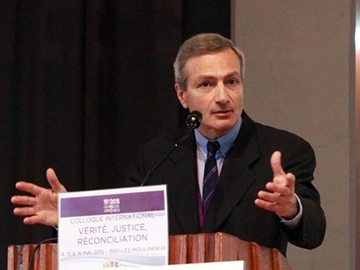By Philippe Raffi Kalfayan
A recent column in the Armenian Mirror-Spectator (“Intolerance Toward ‘the Other’” by Raffi Bedrosyan) reported on a shocking event that happened in Turkey during the inhumation of a non-Turkish person, displaying an unequalled degree of hatred and intolerance toward the “other” to the extent that the family had to forcibly renounce burying its relative in that cemetery, because the protesters claimed the cemetery soil was forbidden to Armenians. This is the occasion to stress that such discriminatory intolerance is a source of evil and may prompt or result in most severe violations of international human rights law, namely crimes against humanity, the supreme form of which is genocide.
In Turkey, the ideology and then the Constitution of the Republic of Turkey rely upon constitutional segregation, both ethnic and religious. The Constitution recognizes exclusively “Turkishness” and the Treaty of Lausanne, considered as a fundamental law, distinguishes the Muslim from the Non-Muslim.
Since the time before the Genocide, the “other” is seen as an enemy (“the enemy of the interior”) when it relates to minorities, or as a “giaour” (infidel) as it relates to non-Muslims.
Already in the 19th century, the Armenian Christian minority was seen as “other” because [of the need to be] “protected” either by the Western nations or/and by the Russian Empire. They became “enemies” for the purpose of justifying the “final solution” in 1915.
Peter Balakian quotes in The Burning Tigris British ethnographer William Ramsey, an enthusiast of Turkish civilization who spent more than 10 years in the country, and described what being a “giaour” implied: “The Turkish law (…) was synonymous with unspeakable contempt (…) The Armenians (and the Greeks) were dogs, pigs (…) good for spitting when their shadow was grazing a Turk, good for humiliation, mats to clean the mud off. Imagine the inevitable result of several centuries of slavery, to endure insults and scorn, centuries during which nothing of what the Armenian possessed — nor his properties, nor his house, nor his life, nor his own person, nor his family — was sacred or escaped violence — an unreasonable and gratuitous violence — and when resisting it in a violent way meant death.”








